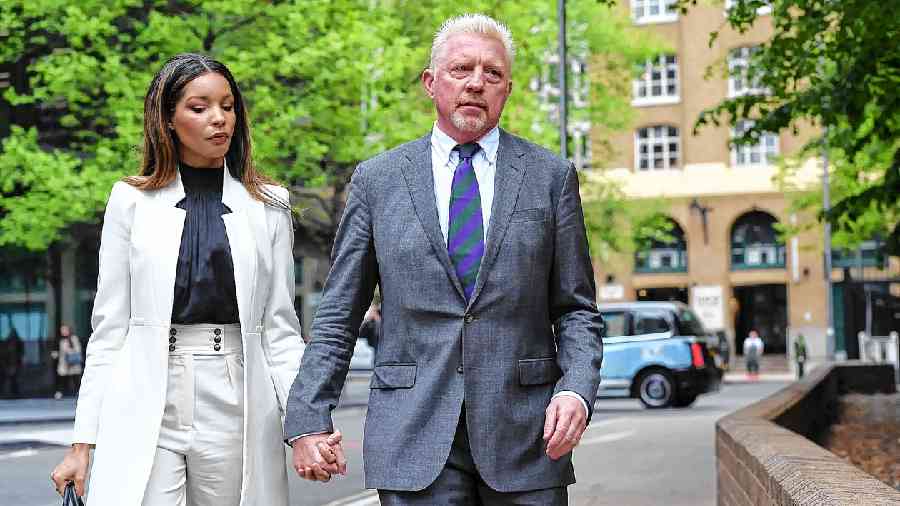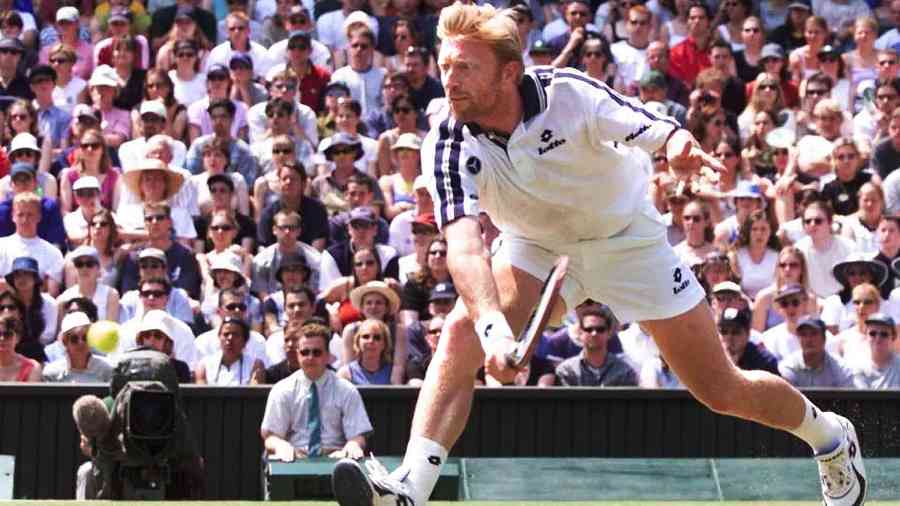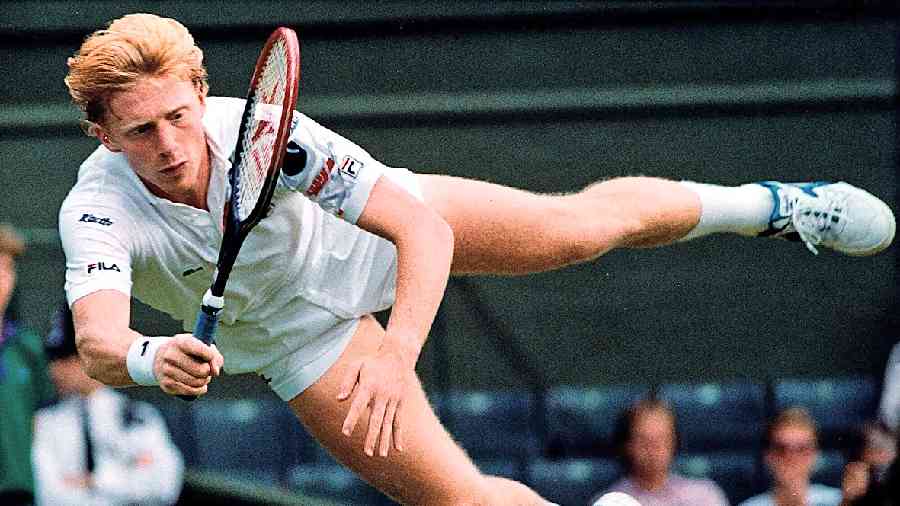There is something about athletes achieving a level of greatness as teenagers that makes watching them progress into middle age especially jarring.
The toll of life replaces the exuberance of youth. Paunch overtakes once-chiseled physiques. In the most unfortunate cases, bad decisions from the triumphant years, the years after, or both, lead to an existence that seemed unimaginable back when life brought the glory of championship after championship and the attendant glamour.
This is what comes to mind when Boris Becker — a Wimbledon singles champion at 17, an inmate in a British prison at 54 and now a free man at 55 — appears on a laptop screen in his first interview with The New York Times since he was released from prison late last year. Becker served eight months of a two-and-a-half-year sentence for hiding and transferring money and assets during a bankruptcy proceeding. He was previously convicted of tax evasion in Germany in 2002.
Now, he hopes, all that is behind him, and he can begin to reclaim the better parts of his pre-incarceration life, doing what retired tennis greats of a certain age generally do — commentating on television and picking up work as an occasional coach and adviser for younger players.
‘A little bit of wisdom’
Becker, a six-time Grand Slam champion, has a sadly unique but valuable perspective on the perils and pitfalls of life as a modern tennis star.
“I have now a little bit of wisdom of what to do and certainly what not to do,” he said.
The prison uniform is gone, replaced with a neatly tailored blue suit. Sitting in front of a camera in Dubai, where he had travelled for business meetings and interviews, Becker was noticeably thinner than before his incarceration, though his blue eyes were once again bright and hopeful, compared with his sagging, heavy-lidded demeanour of a year ago.
Becker’s rise and crash are portrayed in a new two-part documentary, Boom! Boom! The World vs. Boris Becker, by Alex Gibney and John Battsek. Becker participated in and is promoting the series, which has had its premiere on Apple TV+, but unlike many celebrity documentaries these days, Boom Boom is not a vanity project in which the subjects or members of their management teams serve as executive producers, craft the narrative and gain from its financial success.
That is not how Gibney (Enron, The Armstrong Lie, Going Clear) and Battsek (Searching for Sugar Man, One Day in September) work. It’s also not what Becker, who has always gone his own way, both on and off the tennis court, with occasionally calamitous results, was interested in.
“If you are a co-producer, you’re going to cut the corners, you’re not going to show yourself the way that maybe the outside world sees you,” Becker said. “It shows you in a much better light than you truly are. And for me, you know, honesty was always important.”

Becker and his partner, Lilian de Carvalho, in London before Becker’s sentencing in 2022
A sordid story of philandering
The result is a bare-knuckles portrait of a player who as a teenager rose to the pinnacle of his sport and peak celebrity in Germany, his home country. His seemingly perfect marriage to Barbara Feltus, a Black woman, served as an inflection point for race relations in Germany (after eight years, the marriage ended in divorce).
But in retirement, Becker’s life degenerated into a sordid story of philandering, failed business ventures, bankruptcies, tabloid scandals and prison time. Along the way, there was also a nearly three-year stint coaching the world No. 1 Novak Djokovic through one of the most successful periods of his career.
Gibney, the writer and director who is a self-described “tennis freak”, said he had been drawn to footage from a 1991 documentary in which Becker said he enjoyed falling behind by a set or two in matches. That would focus his mind, Becker said, and then he would roar back.
“Not such a good plan in real life, and not a really great plan for tennis, either,” Gibney said.

He also was not mentally prepared when he retired for the shock of being called old at 35 and of having to start a second career from scratch
The swagger
Battsek, the producer, said he initially approached Becker about making a documentary in 2018, before Becker’s bankruptcy cascaded into a criminal conviction. Gibney interviewed him extensively in 2019, and again last year after his conviction and just days before his sentencing, when an overweight and scared Becker tried to have his say for what he anticipated could be the last time for several years.
“His biggest mistake was to mistakenly think the swagger that carried him through everything would carry him through tricky ground when it came to his financials,” Battsek said of Becker. “You’ve got to be smart enough to know, ‘I can’t swagger through this.’”
Becker was released from prison early under a fast-track deportation programme for foreign nationals, but not before what he described as eight challenging months in two prisons.
“Very difficult, especially from the life that I came from,” he said.
During his first weeks of incarceration, the man who once had ruled hallowed Center Court at Wimbledon was locked inside his cell for 22 hours a day, let out only for lunch and dinner, a shower and a brief period outdoors.
In Becker’s early 20s, when he nearly retired from tennis on multiple occasions, he would spend hours at night in his hotel room writing in his journals. Similarly, the isolation in prison gave him plenty of time to reflect on where his life had gone wrong, he said. He remembered plenty of poor choices — putting too much trust in managers and advisers, impregnating a woman in the back room at a Nobu restaurant in London, making a series of poor investments. He also thought about the good times, though, the great moments of his career and all the high-flying luxuries his success afforded him.
He said he feared for his safety in prison, but that he checked his ego and fell in with a group that protected him. He declined to provide details.
“There’s a code of honour that you don’t speak about prison on the outside,” he said. “I have too much respect for the inmates.”
He knows his life did not have to go the way it did and that he should have spent more time during his playing days locked in an office, familiarising himself with all those documents he signed, instead of on a beach or a tennis court.
He also was not mentally prepared when he retired, he said, for the shock of being called old at 35 and of having to start a second career from scratch.
But now he is starting over once more. Eurosport hired him to commentate on the Australian Open. He is hopeful that some of his other partners and employers will return as well. For the first time, he is keeping his goals small.
“I’m sort of in late summer, fall, of my life, so I want to really work on the next 25 years,” he said. “You look back on your life incarcerated, you look back on your professional life as a player, as a coach, as a commentator. You want to learn from the experience, you want to improve on some of the things that you started. And so that’s my goal.”
The New York Times News Service
